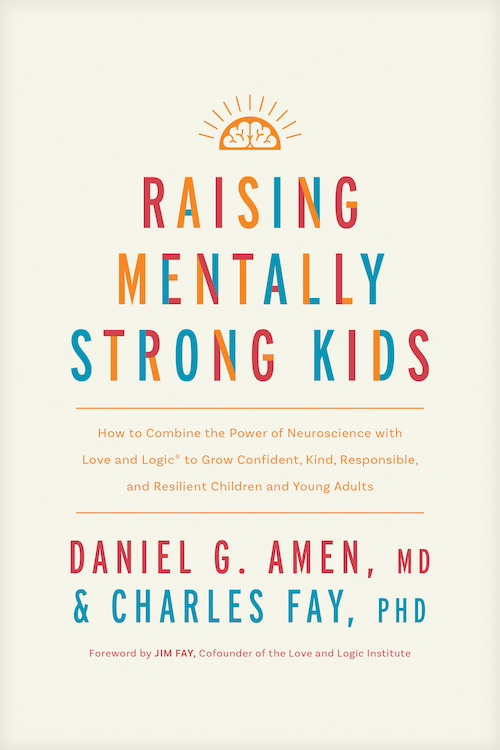Tapping Into Healthy Mental and Spiritual Habits for Our Families: Dr. Daniel Amen, Dr. Charles Fay & Melina Luna Smith
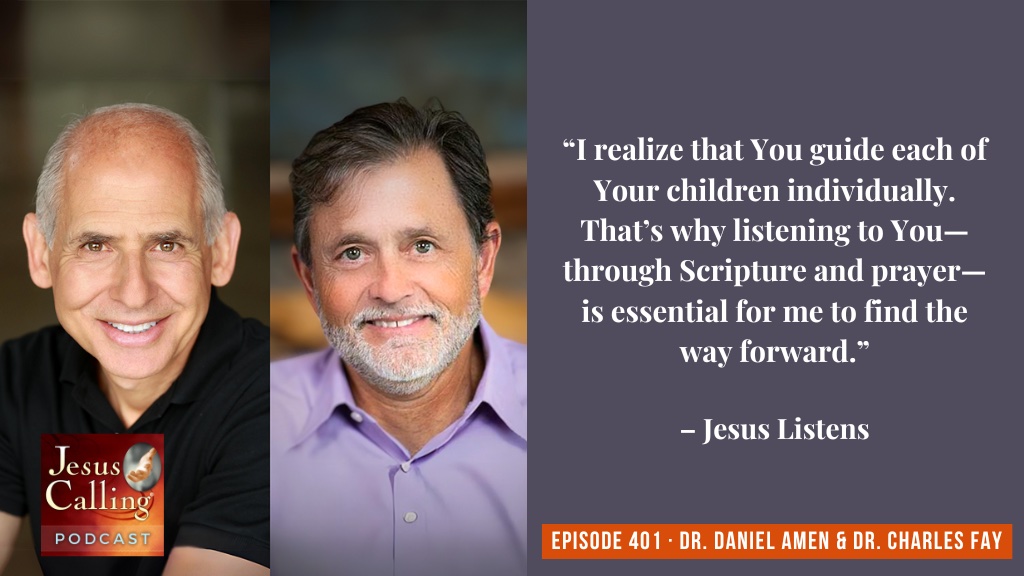
Dr. Daniel Amen: There’s actually very good research on faith and prayer enhancing mental health. So having a regular practice where you and your children learn that you are not the center of the world, but you are part of it, and that God made you for a purpose, and connecting with God on a regular basis enhances who you are.
Tapping Into Healthy Mental and Spiritual Habits for Our Families: Dr. Daniel Amen, Dr. Charles Fay & Melina Luna Smith – Episode #401
Narrator: Welcome to the Jesus Calling Podcast. The Bible reminds us over and over what a gift from God children are. As parents, it’s easy to get overwhelmed with all the different worries when it comes to raising a child: Are they healthy? Are they happy? Are they kind to other people? One essential element of parenting that sets a great foundation for a child’s well-being is modeling a spiritually healthy life for our kids, so that they know there’s a God who cares for them, and listens when they pray.
This week, we get to hear from three experts on how we can mentally and spiritually nurture the young minds of tomorrow. Dr. Daniel Amen is the founder of Amen Clinics, and a leading expert in brain health and mental health. Charles Fay, PhD, is an nationally recognized author and president of the Love and Logic Institute, which joined Amen Clinics in 2020, offering practical solutions for educators, mental health professionals, and parents dealing with challenging behaviors in youth. Melina Luna Smith is the Executive Director of Storymakers NYC, who works with parents to reach their children through storytelling, and gives tips on how to incorporate story into the everyday life as a family, as a way to connect and teach faith values as well.
Let’s begin with Dr. Amen and Dr. Fay.
Dr. Charles Fay: Hi, I’m Dr. Charles Fay. I’m president of the Love and Logic Institute. My team and I, we’ve been traveling around the world working with parents and educators about how to raise respectful, responsible, resilient kids. Most importantly, I’m a dad and I have three boys, and I need all the help I can get, too.
Dr. Daniel Amen: I’m Dr. Daniel Amen. I am a child and adult psychiatrist, the father of six, grandfather of five. I’ve been teaching parent training for the last forty years or so.
Psychology Foundation
Dr. Amen: So for the last thirty-three years, I’ve been looking at the brain. So I’m a classically trained psychiatrist, and I was taught to make diagnoses based on symptom clusters with no biological data. And I soon came to realize that’s insane, right? Psychiatrists are the only medical doctors who never look at the organ they treat. And after I started looking at the brain with this study called Brain SPECT Imaging in 1991, it changed everything in my life. I came to realize most psychiatric problems are not mental health issues, they’re brain health issues, because when your brain is healthy, you think better, you feel better, you act better.
Dr. Fay: We are seeing so many parents who want to do the right thing, but honestly, they’re not quite sure, and there are so many different conflicting opinions. All you have to do is do a Google search, and pretty soon you are seeing a lot of that information. We’re bringing this science, this neuroscience, and plugging it into the practical psychology of Love and Logic [Institute], and we’ve been helping parents learn how to set limits over really difficult issues.
Creating Boundaries to Get to Joy
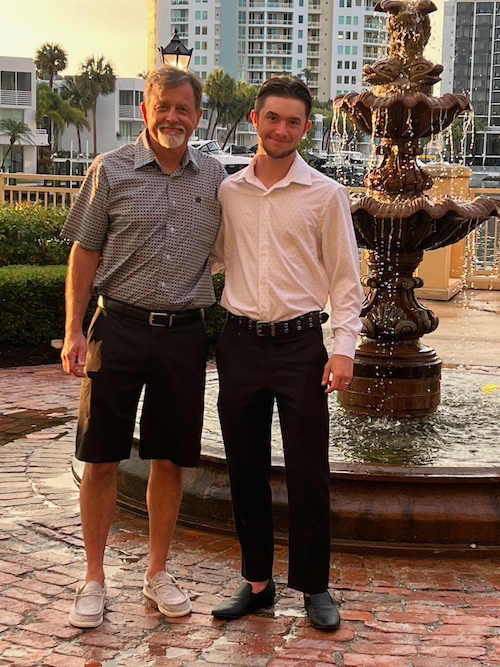
If kids don’t have limits, they grow up to be anxious and depressed people who are absolutely no fun to be around. I mean, there is plenty of research coming out that says very clearly the permissive model or the inconsistent model is a guarantee for raising an unhappy, anxious, depressed kid. Isn’t it ironic that we sometimes fall into the trap of thinking, Well, if I’m just nice and I kind of skirt around the issues in my home and don’t set those limits, everybody will be happy? Nothing is farther from the truth.
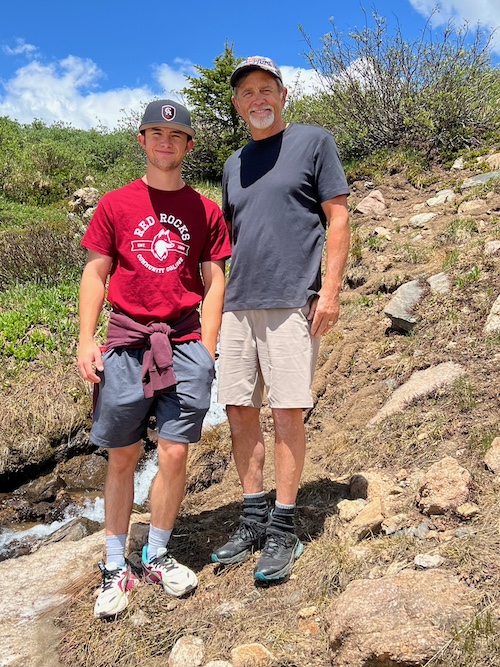
The good habits that our kids have to start with are our good habits. That’s the good news and the bad news at the same time, right? And one habit we need to lock down on and make central in our lives is the relationship habit. Nothing works without a relationship. If our kids are not bonded with us, what are the chances that they’re going to listen to us when we say something like, “I don’t think it’s a good night to go out, why don’t you stay at home?” What are the odds that a teenager who doesn’t respect and love us is going to listen to that. And so we want to do lots of eye contact, lots of smiles, lots of loving touch.
“The good habits that our kids have to start with are our good habits.” – Dr. Charles Fay, Ph.D.
Dr. Amen: There are expectations on how we behave and how we treat each other, but we’re connected. And bonding requires two things, time—actual physical time not on your phone—time with them. So time and then a skill that seems to be disappearing is to listen to them. There’s something that therapists use called active listening that when they say something, don’t use it as a teaching moment. When they say something, repeat it back, and really listen to them talking through whatever issue they bring up. You know, when couples actively listen to each other, their relationships are better. When parents actively listen to the children rather than talking over them, their relationship is better.
Grace for the Little Mistakes
Dr. Fay: Kids need to make lots of small, affordable mistakes when the price tag is small.
Dr. Amen: Your brain is not finished developing until you’re about twenty-five, it’s the reason God gave you parents. The more you supervise them in a loving way, while letting them make affordable mistakes, the safer kids are going to be.
Dr. Fay: So what we teach parents is hope and pray that there are plenty of opportunities for your kids to make little mistakes. How about forgetting a homework assignment and getting a bad grade on it when you’re in the fifth grade? Is that pretty affordable? Or how about getting to the baseball field without your baseball glove and having to figure out how to borrow one, or maybe sit out? It’s a painful thing, but can kids learn from that? Or how about them not eating enough and being hungry for a little while, or buying a toy with their own money and having it break right away? I even say, parents, write down the mistakes you hope and pray that your kids make.
“Write down the mistakes you hope and pray that your kids make.” – Dr. Charles Fay, Ph.D.
I knew a lady and she had a little foster kid who’d had a pretty rough life so far, and he learned how to get adults really mad. And so he brings home a bad report card and his new foster mom—who’s just a gem—looks at this kid, and she says, “Oh, Roger, I can’t imagine how disappointing it must be to get a report card like that.” And he says, “Well, what are you going to do?” And she says, “Roger, honestly, I can’t think of anything that your dad and I could do that would make you feel worse than you already feel. We’re going to love you regardless of the number of years it takes you to get through school. We’re just going to love you.” Oh, he stomped off, but she said, “I knew it was working, because he spun around on his toes and he looked at me and he had his arms all crossed and his face was red. And he said, ‘Well, I didn’t care until you had to say that.’” So we see that when we’re loved and somebody cares about us for who we are, not what we produce, isn’t that the heartfelt desire that only Jesus Christ can fulfill perfectly?
When do we really oftentimes have the closest, deepest faith encounter with our Lord? Is it when things have gone really well and we’ve made really good decisions, or is it maybe when we’ve exercised some free will and we haven’t made such a good decision, and then we look up and we say, “Oh, please, Lord, I know that I can trust you”? And that’s a faith exercise. We all need those.
“When do we really oftentimes have the closest, deepest faith encounter with our Lord? Is it when things have gone really well and we’ve made really good decisions, or is it maybe when we’ve exercised some free will and we haven’t made such a good decision, and then we look up and we say, ‘Oh, please, Lord, I know that I can trust you’? And that’s a faith exercise. We all need those.’” Dr. Charles Fay, Ph.D.
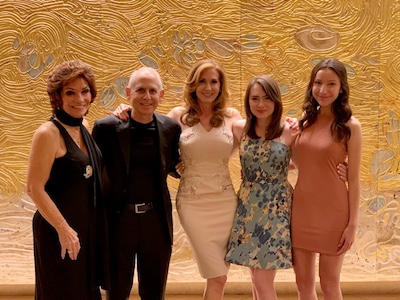
Dr. Amen: And, you know, one of the big a-has is if you do too much for your children, it’s often from low self-esteem in the parents. It’s like, I love you so much, I don’t want you to suffer, but having that mindset creates lifelong suffering in children. So we teach them about bonding, about rule-setting, noticing what you like more than what you don’t, but hoping and praying for those affordable mistakes so you can teach kids to be responsible.
Helping Your Kids Connect to Their Faith
If you want to give your child the greatest gift, which is the gift of faith, you need to work on your relationship with God, of course, but also with your kids.
“If you want to give your child the greatest gift, which is the gift of faith, you need to work on your relationship with God, of course, but also with your kids.” – Dr. Daniel Amen, MD
Dr. Fay: And, you know, actually, I’ve learned a lot about physics and chemistry from one of my sons by doing that. We made it fun. We’re excited about what you’re learning and what you’re involved in. And my wife and I, we would say things like, “Yeah, thanks for sharing that, and we love you enough to really be involved with you. You’re special to us.” When they connect with us, they put our values inside of their heart, those values travel around with them.
“When [children] connect with us, they put our values inside of their heart, those values travel around with them.” – Dr. Charles Fay, Ph.D.
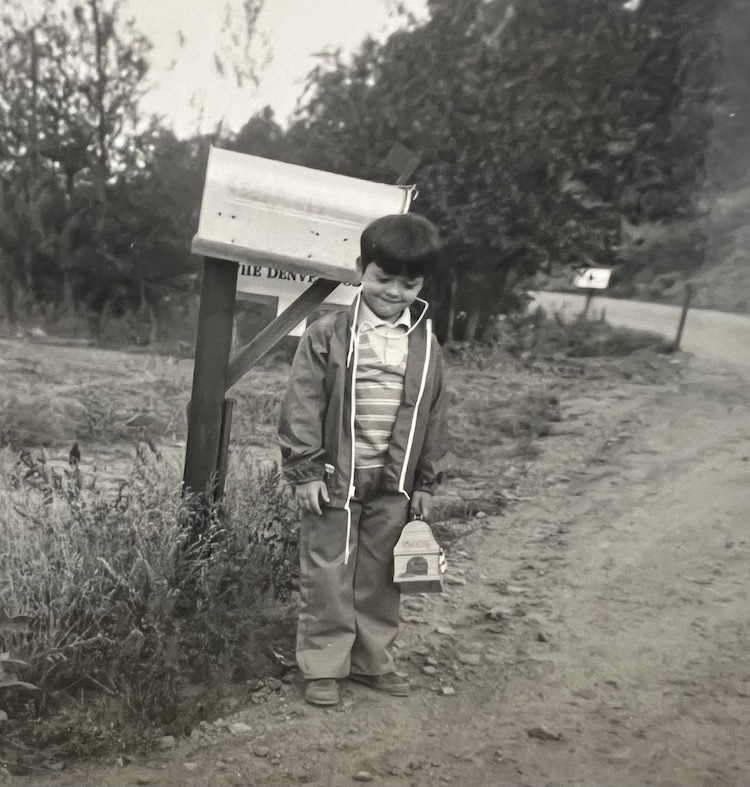
My mother was very kind and firm and she had a lot of good rules. I tried so hard to rebel against her value system, but it just stuck. And as I’ve gotten older… she used to talk a lot about how much Jesus loves us and all those good things. I think about my mom and I think about how true those things are that she said. And so, yeah, they’ll try to rebel, but if you have that good, solid relationship and they respect you, you’re going to stick on them. There’s just no substitute for being involved.
I love that we’ve been given the gift of being able to go to the Lord and say, “Hey, even though you got this, I’m struggling.” That’s called humility. It’s good for all of us. And when we have more of that, we’re less stressed by the things that our kids do that we honestly can’t control.
Dr. Amen: Every night before I go to bed, I say a prayer and connect with God, and then I go on a treasure hunt. I do this exercise called What Went Well? So connect with God, say a prayer and then go, Hey, what went well today? But in looking at what went well increases your level of happiness and it’s just absolutely critical. So having the discipline to practice prayer, and while you do this, [have] gratitude, and then go on that treasure hunt for what went well today. It’ll help your brain work better.
Dr. Fay: I’m reading from Jesus Listens, January 6th:
Most of the situations that entangle my mind are not today’s concerns: I’ve borrowed them from tomorrow, next week, next month, or even next year. When this is the case, please lift the problem from my thoughts and deposit it in the future—veiling it from my eyes. Then draw my attention back to Your Presence in the present, where I can enjoy Your Peace.
In Your perfect Name, Jesus,
Amen
Narrator: Be sure to check out Dr. Amen and Dr. Fay’s new book, Raising Mentally Strong Kids, at your favorite retailer.
Stay tuned to Melina Luna Smith’s story after a brief message.
Give the Gift Of The Bible
It goes without saying, but the Bible has changed so many lives. Take a second to think about if you didn’t have access to a Bible or the freedom to own one. This is a reality that many are facing. That’s why I want to tell you about one of our partners, Cru [Campus Crusade for Christ]. Cru has missionaries in almost every country, and they’re seeing people come to know Jesus.
There’s just one thing they’re missing: a Bible in their own language. One missionary said, “I’ve never seen such a thirst for the Word of God in my country.”
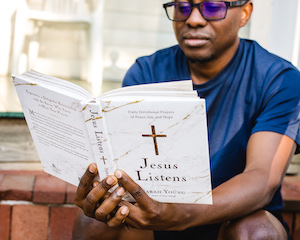
For only $24 a month, you can provide three people with Bibles each and every month. When you sign up to provide three Bibles with a monthly gift of $24, as a thank you, Cru will provide meals to 12 hungry individuals through their humanitarian aid ministry. Plus, you’ll receive a free copy of our Jesus Listens devotional. Simply text “Calling” to 71326 to help today.
Imagine just how much this gift could change someone’s life. So text “Calling” to 71326 to help now or visit www.give.cru.org. Messaging and data rates may apply. Available to U.S. Addresses only.
Celebrate Easter with Jesus Calling
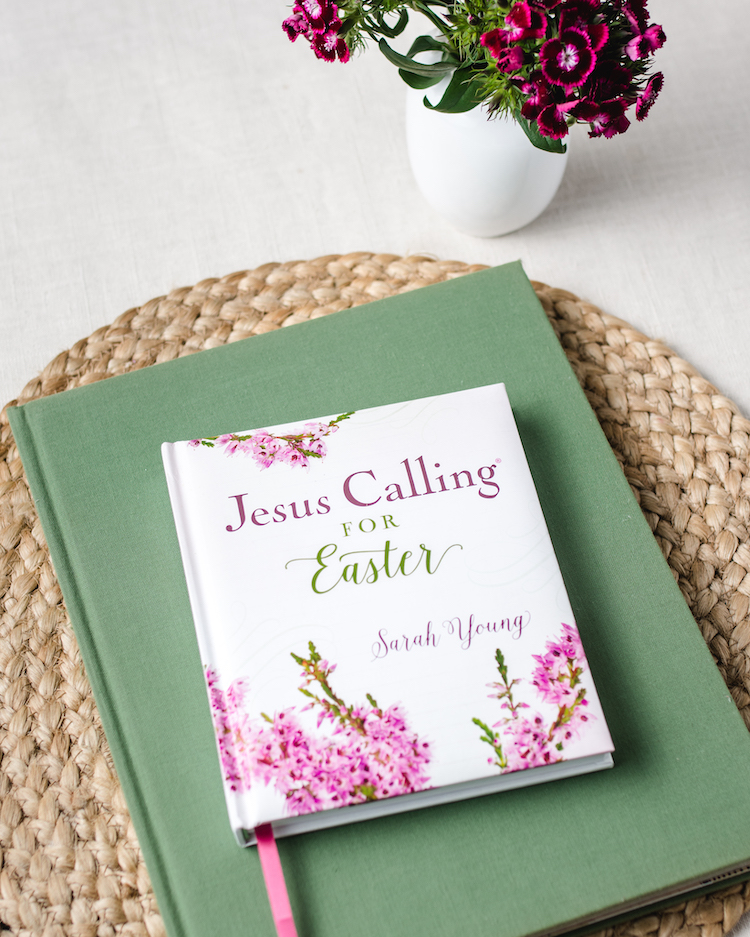
Experience the hope of the resurrection with Jesus Calling for Easter. This book offers 50 seasonally-themed devotions from Sarah Young’s New York Times bestseller Jesus Calling. Inside, you’ll find resurrection truths, hope for the new season, joyous reasons to celebrate, and full Scripture verses.
Get your copy to create a daily reflection of hope throughout the Easter season. Jesus Calling for Easter also makes a wonderful gift to be cherished for years to come.
Our next guest is Melina Luna Smith, the executive director of Storymakers NYC, who shares with us how we can use art and imagination to bring the stories of the Bible to life for kids, reminding children that they’re never alone in God’s big story.
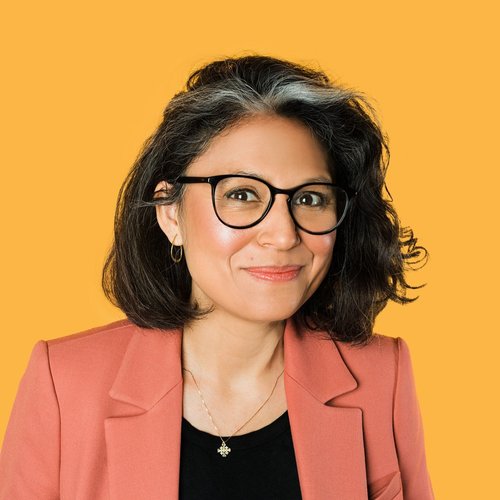
Melina Luna Smith: Hey friends, my name is Mel, and I’m the Executive Director of Storymakers NYC. I am the mom of two teens, Sophia and Henry, and my husband is a pastor here in the heart of Manhattan.
I’m a kid far away from home here in New York. I was born and raised in Tucson, in Phoenix, and I grew up in the church, and I would go to church with my dad all the time. He’s a worship leader, and he would take me on many trips to Mexico to work with pastors and families down in Ensenada, and that is one of the most significant markers, I would say, in my life—going down and spending time with people who just were full of joy and excitement in the Lord in a way that I didn’t see back at home. That played such a big mark in my life, connecting with people I never knew, but we are all connected around God’s big story.
I loved being in the desert, and my imagination was always wild. I always loved imagining other worlds, and possibilities. And so tethering my experience in Mexico and my wild imagination, I can see in hindsight that God was preparing a way for me to create something new and fresh in the world for kids and teens.
Engaging Kids with the Story of God
When I took on kids and family programming here at our church, I took a look around at the landscape of what was available in terms of content. What was available were things that felt very entertaining and consumer driven, just like, fast food vibes, right? Or you had things that were theologically deep but not that visually compelling or creatively engaging. So you kind of have these extremes of either entertainment at play or you had deep stuff that was not going to connect with kids. So we wanted to create a world that was in between that space, right? We’re holding truth and we’re telling kids real stories that are compelling, full of drama, God’s in the mix of it, there’s a lot of redemptive narrative happening in the mix of it, and at the same time, drawing them in through creativity, play, embodying the story. So we wanted to mix those things up because [A], we want kids to be engaged with the story, and [B], we really want them to walk away with information and an experience that is meaningful and that is going to shape and form them, so that they know that God is with them, for them, now and always.
“We want kids to be engaged with the story, and we really want them to walk away with information and an experience that is meaningful and that is going to shape and form them, so that they know that God is with them, for them, now and always.” – Melina Luna Smith
God is the ultimate story maker, and we are story makers too. And I saw that most significantly in my time as a behavior therapist when I was working with challenging teens and kids. And I always found that art builds connection, and I thought that this must be rooted in the fact that we were born to be creative, and that we are born to be in community with one another.
“God is the ultimate story maker, and we are story makers too.” – Melina Luna Smith
Our church didn’t really have a program when I came on the scene here, and I thought, That’s really not good! Because when I was a kid, I knew that these stories were really important for me. They helped me feel anchored, and when I was afraid, I knew that God was for me and with me because He was with Daniel in the lion’s den. And He was with Noah when he was in the ark. And so out of that, I wanted kids to know that God was with them and for them. And how could we bring that tangibly, directly to them?

Just as Jesus would always bring the parables to the listeners, He was drawing a story. He was drawing a picture of what was heavenly truth for us to hear, and so I thought, I think we can do something like that.
“Just as Jesus would always bring the parables to the listeners, He was drawing a story. He was drawing a picture of what was heavenly truth for us to hear, and so I thought, I think we can do something like that.” – Melina Luna Smith
We’ve all been in those Bible studies where we read a passage to a group of kids and they’re like, “Well, what do you think? How do you feel? How have you seen yourself in the story?” And it’s sorta crickets, especially with teens. Maybe your own kids are coming home from school, like, “What’d you do today?” “Nothing.” That’s super common.
When we built StoryMakers, I was really hoping to build a connection between grown-ups and kids. We always integrate social emotional cues and questions so that bigs and littles can hear from one another and be connected around like, “Hey, I’m afraid of the dark too, but what’s so great about the dark?” And be able to share that experience, and for them to know that the grown-ups are afraid of things as well.
Stop, Breathe, and Pray
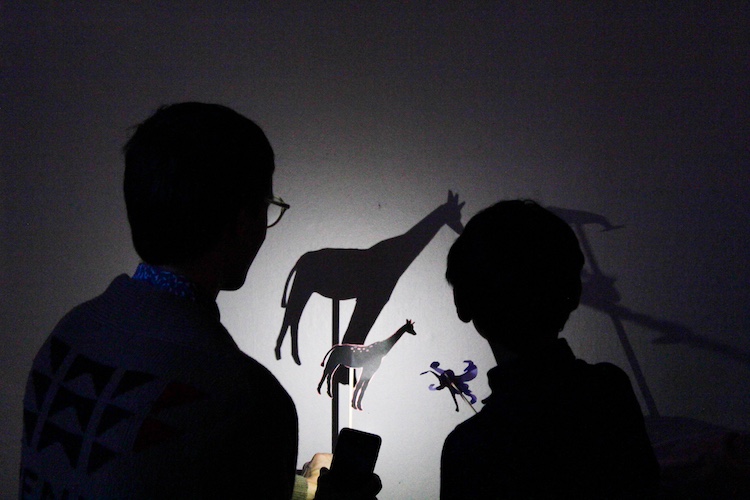
Walt Disney said, “Our imaginations grow flabby over time.” And I used to think that was true for grown-ups, but I actually think it’s not true. I think that our imaginations just go towards the negative. And so what we begin to imagine is a negative. And so when you’re thinking about your kids, you always want to keep the imagination towards the positive, right? It’s really about quality versus quantity. And so it’s all about making small connections and making small wins.
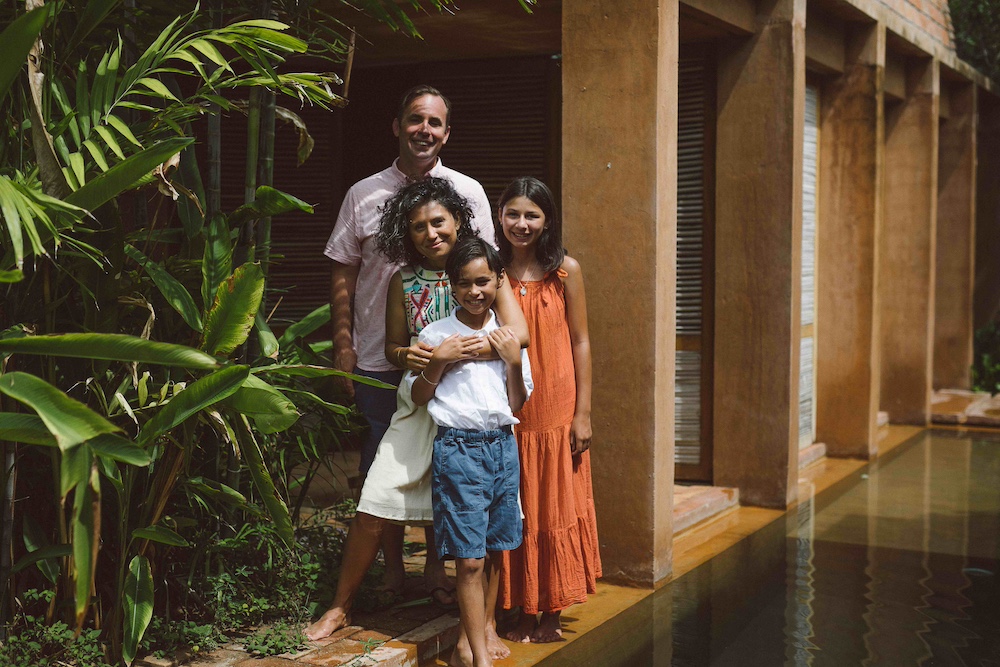
So when your kid comes home from school and maybe they’re not super expressive, or you can tell that they’re tired, exhausted, and maybe they have a lot of big feelings—this happens often when you’re getting ready for school or when kids are returning home from school. Make a pathway forward with your kids in ways that are small and tangible. Hve curiosity about your kids and ask them questions that are not right on the nose. We’re trying to spark curiosity. If they expect you to ask the same kind of question every day, they’re not going to be responsive. Right? But if you have an element of curiosity or surprise when you’re engaging your kids, that’s going to shift the space and the room entirely.
When we come home, when we’re at the end of a day, or when we’re starting our day, what are the significant pieces that make our days work? What are the routines? What are the rituals that we have that make our days go well? Kids need the same kind of care and they need the same type of approach.
Have that moment of connection and just to take the minute to say, “We’re going to stop, we’re going to breathe and we’re going to pray, and you get sixty seconds, and then we’re going to move forward to the next thing, whatever the next thing is, we’re going to put our shoes on. We’re going to go in the car. This is what’s happening next.” And for them to be able to begin to build resiliency and understand, If I stop, if I breathe, if I pray, then I’m going to feel better about stepping forward into whatever is ahead that feels like an overwhelm, whatever that may be. Grown-ups, I know we all have our own time constraints, and we all have to be places and we have our schedules. And so oftentimes we feel like it’s an overwhelm to let kids win in terms of them taking up too much time in a tantrum or big feelings. I always say put on a timer, let them have a moment of thirty seconds, and then we’re going to regroup, and then we’re going to move forward. They’ve had a moment to feel what they need to feel. And then you step in and offer a pathway forward to stop, breathe, and pray.
This is an excerpt from Jesus Listens for Kids, May 28th:
Dear Jesus,
Help me remember that challenges and troubles come and go. But You are always with me.
I’m so grateful that You are writing the story of my life! You can see the whole story all at once. So You know everything that has happened and everything that will happen—from the moment I was born until I meet You in heaven. You know exactly what I’ll be like when I’m living in heaven with You. Meanwhile, You never stop working on changing me. You’re always helping me become the person You created me to be. Your Word comforts me and tells me that I’m already a member of Your royal family.
In Your comforting Name, Jesus,
Amen
Narrator: To learn more about Melina Luna Smith and Storymakers, please visit www.storymakersnyc.com.
If you’d like to hear more stories about raising healthy children, check out our Peace in Uncertain Times YouTube video with Dr. Meg Meeker on Jesus Calling’s YouTube channel.
Next week: Tamron Hall

Next time on the Jesus Calling Podcast, we’ll hear from ABC news host Tamron Hall, who shares how she connects the headlines of the day with listeners’ hearts and souls.
Tamron Hall: God does give us free will, and God does provide for us, but He gives us the ambition and the drive to make our dreams come true.
